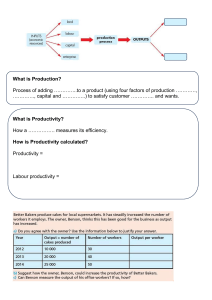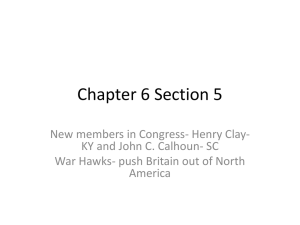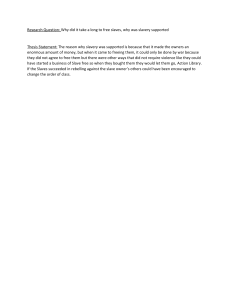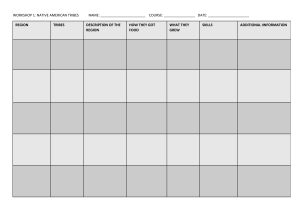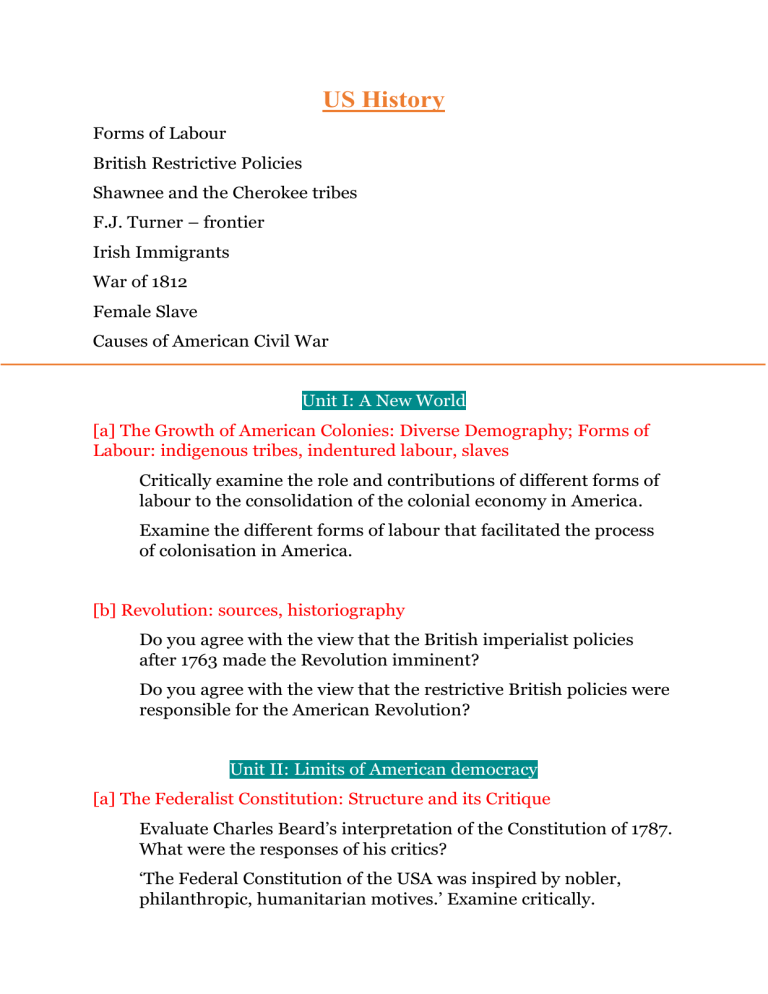
US History Forms of Labour British Restrictive Policies Shawnee and the Cherokee tribes F.J. Turner – frontier Irish Immigrants War of 1812 Female Slave Causes of American Civil War Unit I: A New World [a] The Growth of American Colonies: Diverse Demography; Forms of Labour: indigenous tribes, indentured labour, slaves Critically examine the role and contributions of different forms of labour to the consolidation of the colonial economy in America. Examine the different forms of labour that facilitated the process of colonisation in America. [b] Revolution: sources, historiography Do you agree with the view that the British imperialist policies after 1763 made the Revolution imminent? Do you agree with the view that the restrictive British policies were responsible for the American Revolution? Unit II: Limits of American democracy [a] The Federalist Constitution: Structure and its Critique Evaluate Charles Beard’s interpretation of the Constitution of 1787. What were the responses of his critics? ‘The Federal Constitution of the USA was inspired by nobler, philanthropic, humanitarian motives.’ Examine critically. [b] Jeffersonian Democracy: Its Limitations [c] Westward Expansion: Jefferson and Jackson; Marginalization, Displacement of the indigenous tribes; case histories of the Shawnee and the Cherokee tribes Comment on the American racist and ethnic bias towards the indigenous tribes. Examine with special reference to the resistances of the Shawnee and Cherokee tribes. Examine critically the ‘white advance on native lands’ in antebellum America. Illustrate its impact by the case studies of the Shawnee and the Cherokee tribes Evaluate the contributions of F.J. Turner to the study of the Frontier. Comment on the significance of Turner’s hypothesis of the Frontier as ‘safety valve’. Unit III: Early Capitalism and its inequities [a] Growth of Market Society: Industrial Labour: gender, race, ethnicity [b] Immigrant Labour: religious, racial, ethnic bias; case history of Irish immigrants Examine critically the social evolution and political participation of the immigrants in antebellum America with special reference to Irish immigrants. Discuss the nature and objectives of the Irish Land League in America in the nineteenth century. Did it influence and transform the attitudes of the Irish immigrants towards the American society? Unit IV: U.S. quest for dominance [a] Imperialism and Changing Diplomacy: Manifest Destiny, War of 1812; Monroe Doctrine Analyse critically the origins of the War of 1812. Was it a prelude to Manifest Destiny? Was the Monroe Doctrine a challenge to the world or was it a strategy to fulfil U.S. imperialism? Discuss with reference to its various facets. Examine critically the genesis of the War of 1812. Was it indicative of the USA’s desire for territorial expansionism? Unit V: Slavery [a] The economics of slavery: South vs. North/Debate Evaluate the validity of the definition of slavery as political economy. Was it distinct from northern capitalism? Discuss the political economy of slavery in ante-bellum America. Did it facilitate capitalism in ‘Agrarian South’? [b] Slave life and culture; nature of female slavery; slave resistance (including female slave resistance) Examine the patterns of slave resistance with particular reference to the challenges posed by female slaves in nineteenth century America. Comment on the patterns of slave resistance with particular reference to the role of the female slaves in challenging the nineteenth century racist stereotypes. Unit VI: The Civil War [a] Issues of the War Discuss the main issues that led to the Civil War. Was the war ‘inevitable’? Is it fair to suggest that the Civil War was a ‘brutal and a horrible experience for the soul of America’. Explain in the context of the issues that led to the War. [b] Interpretations
